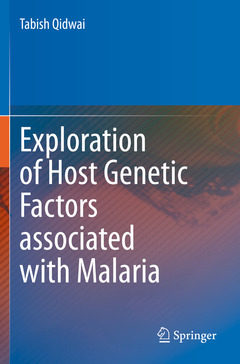Description
Exploration of Host Genetic Factors associated with Malaria, 1st ed. 2021
Author: Qidwai Tabish
Language: English
Subjects for Exploration of Host Genetic Factors associated with Malaria:
Approximative price 168.79 €
In Print (Delivery period: 15 days).
Add to cartPublication date: 03-2022
172 p. · 15.5x23.5 cm · Paperback
Approximative price 168.79 €
In Print (Delivery period: 15 days).
Add to cartPublication date: 03-2021
Support: Print on demand
Description
/li>Contents
/li>Biography
/li>Comment
/li>
Summarizes host genetic polymorphisms that are associated with malaria susceptibility/resistance
Reviews molecular epidemiology and natural selection of alleles in genes associated with malaria
Examines the malarial parasite-imposed selective pressure on the human genome
Covers the genetic control mechanisms in the human genome against malaria in endemic regions




